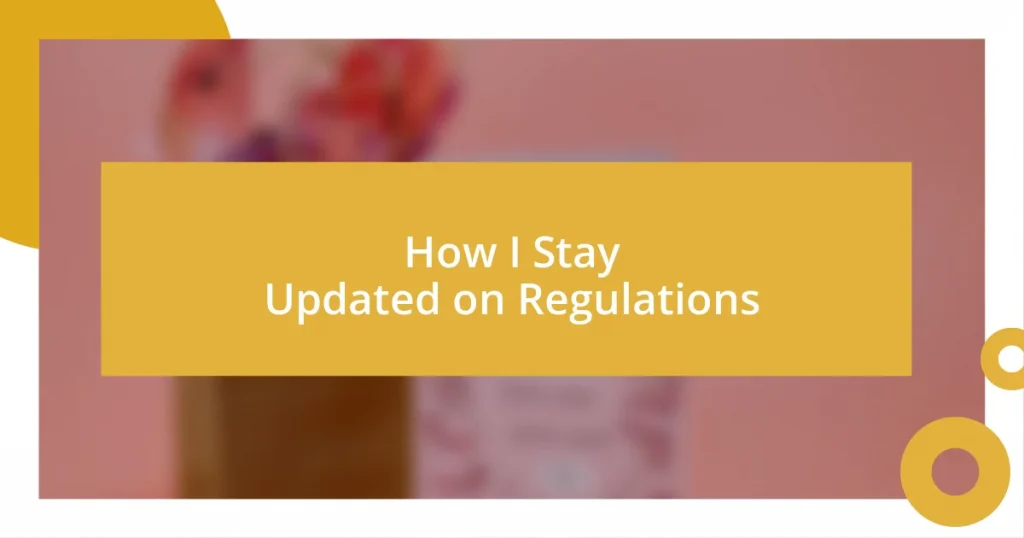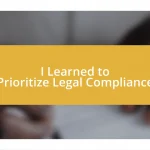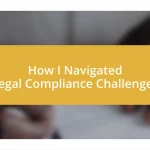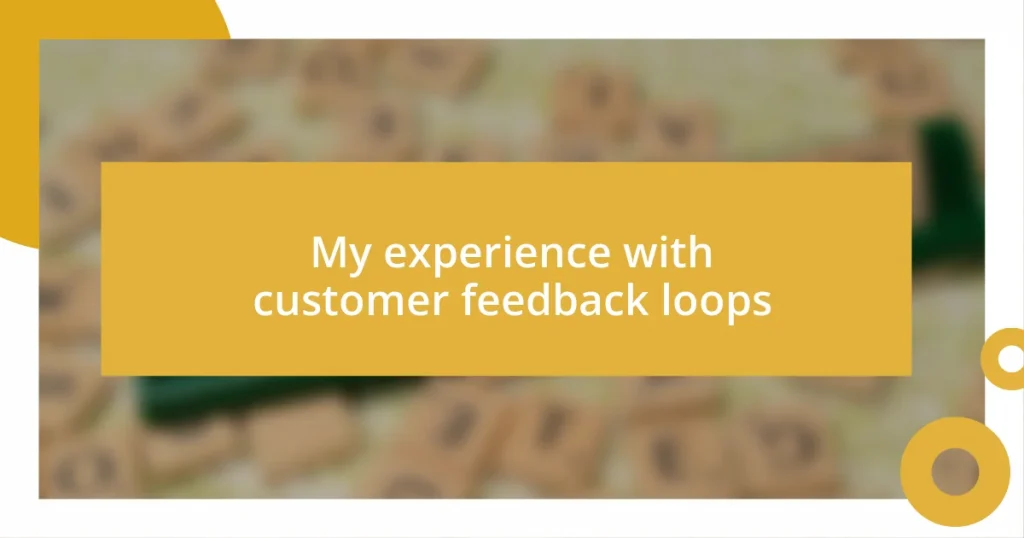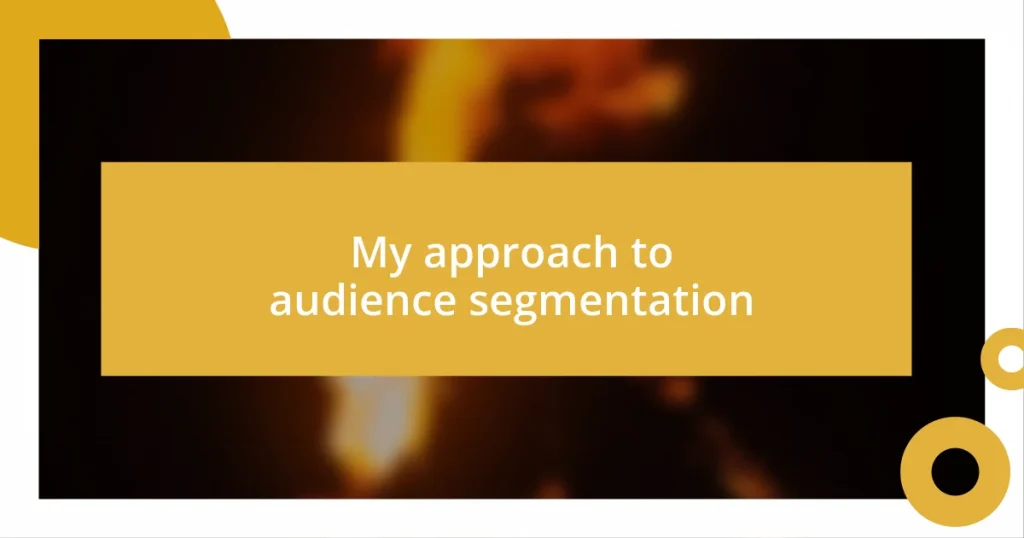Key takeaways:
- Understanding regulations is essential for safety and stability, preventing chaos, fraud, and providing peace of mind in various fields.
- Utilizing a mix of government websites, industry newsletters, and professional networks enhances the ability to stay updated and navigate regulatory changes effectively.
- Networking, attending workshops, and creating a personal monitoring system empower individuals to proactively manage compliance and adapt to regulatory shifts with confidence.
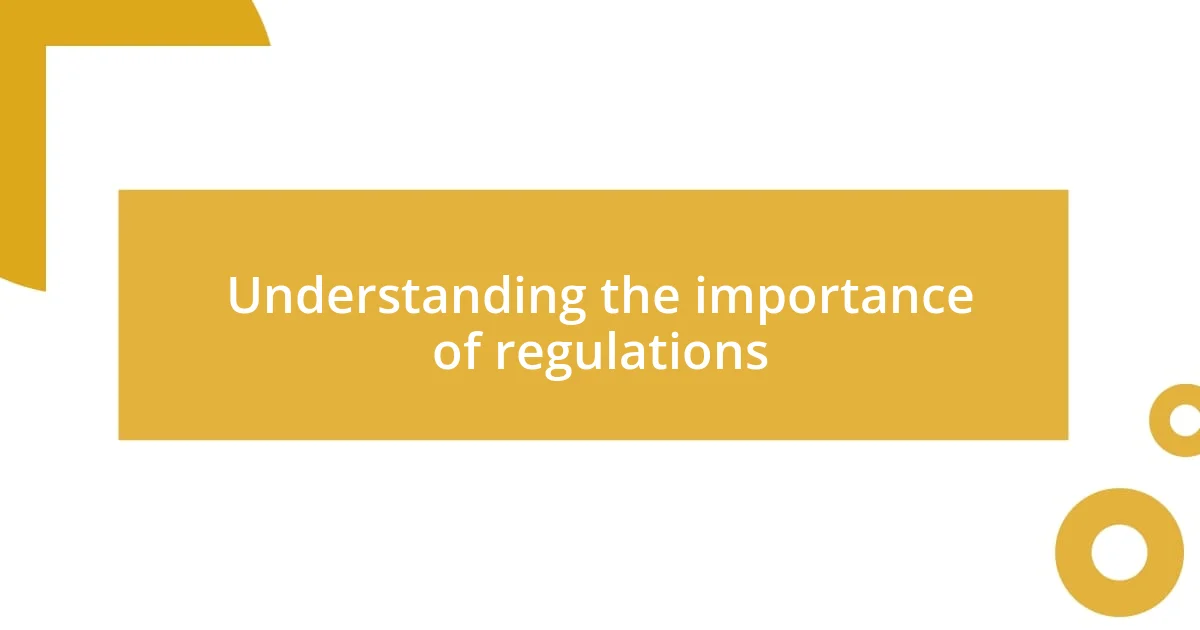
Understanding the importance of regulations
Regulations might seem like a set of rules imposed on us, but they actually serve a deeper purpose: they create a safe and fair environment for everyone involved. I’ve often thought about the last time I encountered a situation that highlighted this—like when I was navigating a complex financial transaction. The regulations in place prevented potential fraud and ensured fair play, making me grateful for the safeguards that were there for me.
Have you ever considered what chaos would reign without any regulations? I vividly remember a time when a close friend of mine started a business without fully understanding local zoning laws. The consequences were overwhelming—fines and forced relocations could have easily been avoided if only there had been a solid framework guiding him. This experience reinforced my belief that understanding regulations is crucial to protecting not just our assets, but also our peace of mind.
When I think about regulations, they feel like the glue that holds systems together, providing consistency in an often volatile world. From environmental standards to workplace safety, these rules shape our daily lives in ways we might overlook. It’s truly fascinating how these seemingly mundane rules play such a significant role in fostering trust and stability in our communities.
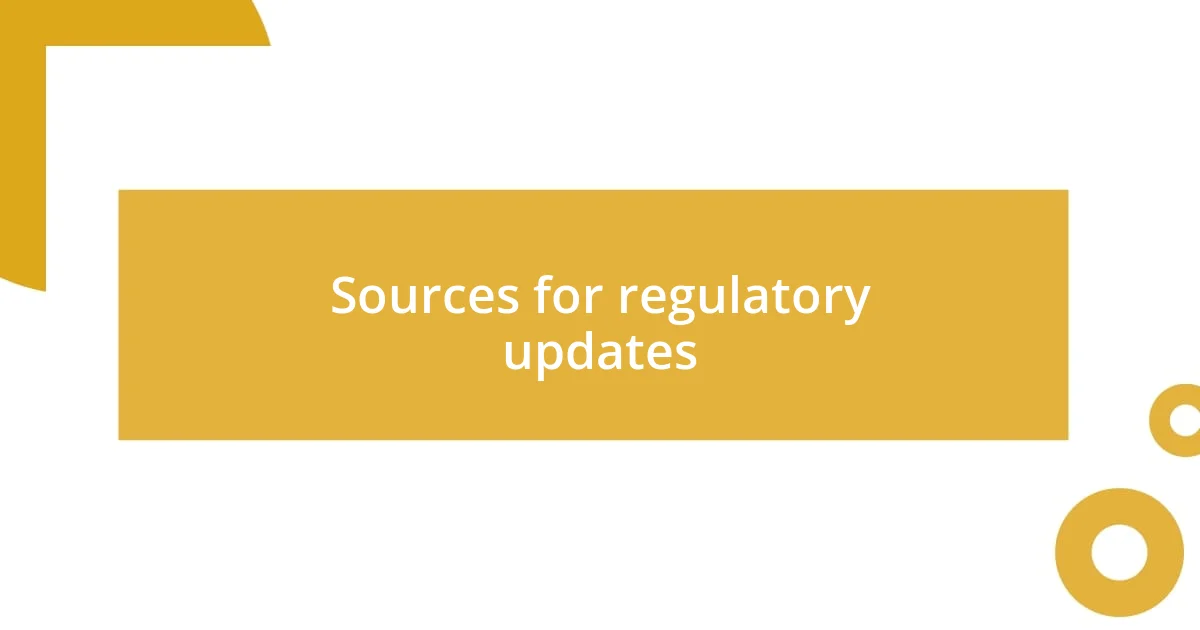
Sources for regulatory updates
Staying updated on regulatory changes requires tapping into various trusted sources. I often rely on government websites for the most accurate and official information. There’s a certain reassurance when seeking updates straight from the source; it feels like having the primary playbook right in front of me.
Another vital area I explore is industry-specific newsletters, which often provide insights tailored to my field. Recently, I subscribed to a regulatory-focused newsletter, and it has been a game-changer. The articles offer not just updates but also analyses that help me understand the implications of those changes.
I also engage with professional networks and forums. These communities share lived experiences and often discuss regulatory shifts and their impacts on practice. I remember contributing to a conversation about new data protection laws, and hearing different perspectives made me rethink my strategies. The blend of firsthand experiences and professional insight is invaluable for comprehensive understanding.
| Source | Description |
|---|---|
| Government Websites | Official updates and comprehensive regulations |
| Industry Newsletters | Curated news and analyses specific to certain fields |
| Professional Networks | Community discussions and shared experiences regarding regulatory changes |
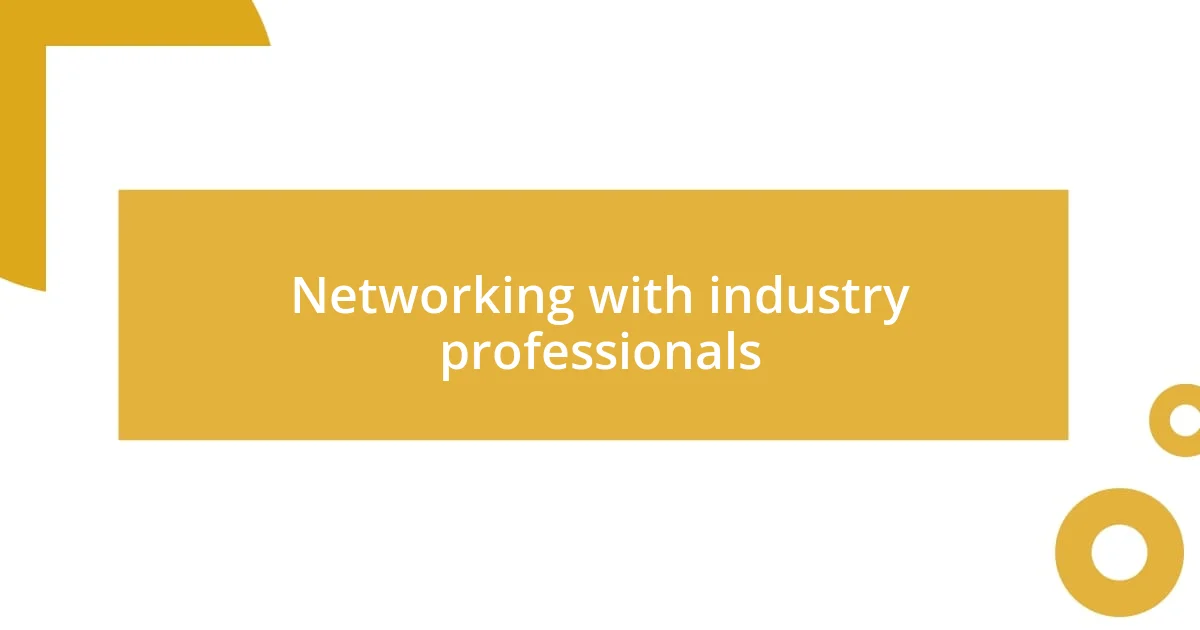
Networking with industry professionals
Expanding my network with industry professionals has been one of the most rewarding strategies in staying updated on regulations. I recall attending a local conference where I casually chatted with a regulatory expert during a session break. That spontaneous conversation unveiled insights I hadn’t encountered in my usual readings—like the nuances of compliance that were specific to our region. Such personal interactions can provide clarity and perspective that simply reading couldn’t offer.
Here are some ways that networking can facilitate updates on regulations:
- Attend industry events: Conferences, seminars, and workshops serve as dynamic platforms for meeting professionals who share similar concerns and insights.
- Join online forums or social media groups: These connections provide a space for real-time discussions on regulatory changes, making it easy to seek advice or share experiences.
- Participate in professional associations: Membership often comes with access to exclusive information, training sessions, and networking opportunities that keep members informed.
- Engage in mentorships: Learning from more experienced professionals can provide invaluable insights into navigating regulatory landscapes effectively.
Networking isn’t just about exchanging business cards; it’s about building relationships that can open doors to knowledge and collaboration. Each conversation can lead to unexpected learning moments, making it a key part of my strategy.
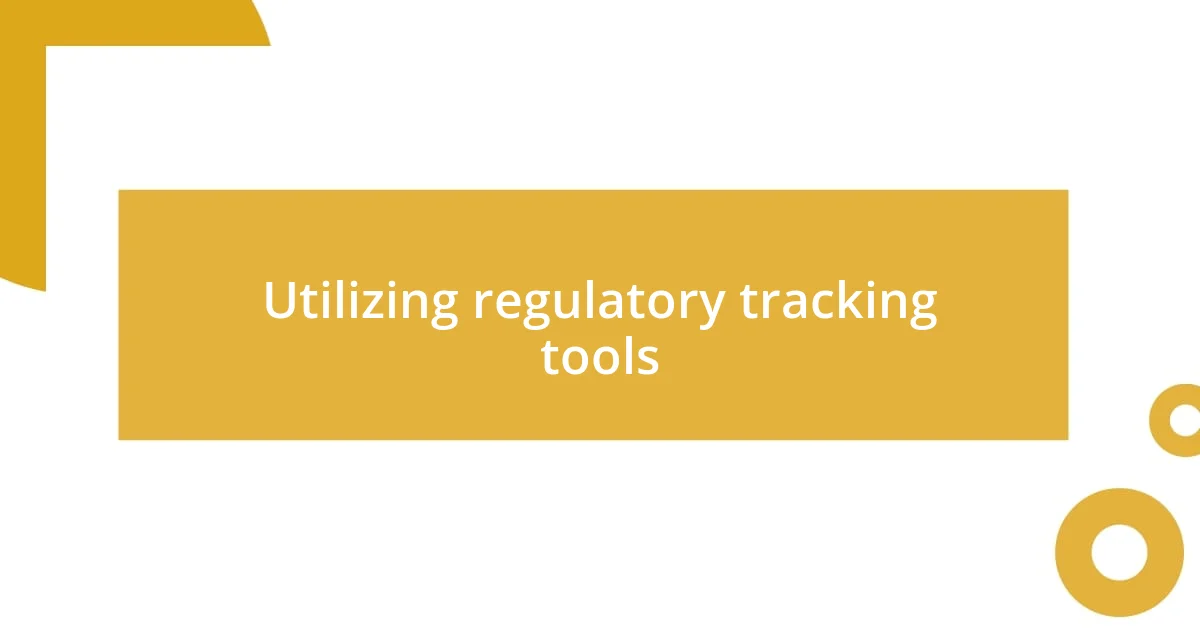
Utilizing regulatory tracking tools
Utilizing regulatory tracking tools is an absolute game changer for anyone serious about staying compliant. I’ve personally found that having a dedicated platform can cut through the noise and provide real-time updates tailored to my industry. It’s almost like having a personal assistant that knows exactly what I need to stay informed—like a watchful guardian ensuring I don’t miss any critical regulatory shifts.
One tool that stands out in my experience is regulatory tracking software. I remember when I first started using one of these platforms; it quickly alerted me to changes in environmental regulations that affected my projects. The tool not only provided a summary of the updates but also linked directly to the full texts of the regulations. I felt empowered knowing that I wasn’t just collecting data; I was integrating this knowledge into my decision-making process.
Have you ever wished you could just filter out the clutter and focus on what’s relevant? That’s the beauty of regulatory tracking tools. I’ve set up customized alerts that notify me about specific changes, which means I can spend more time strategizing rather than sifting through endless articles. These tools have transformed my approach to compliance. They give me confidence, knowing I’m always a step ahead of potential challenges.
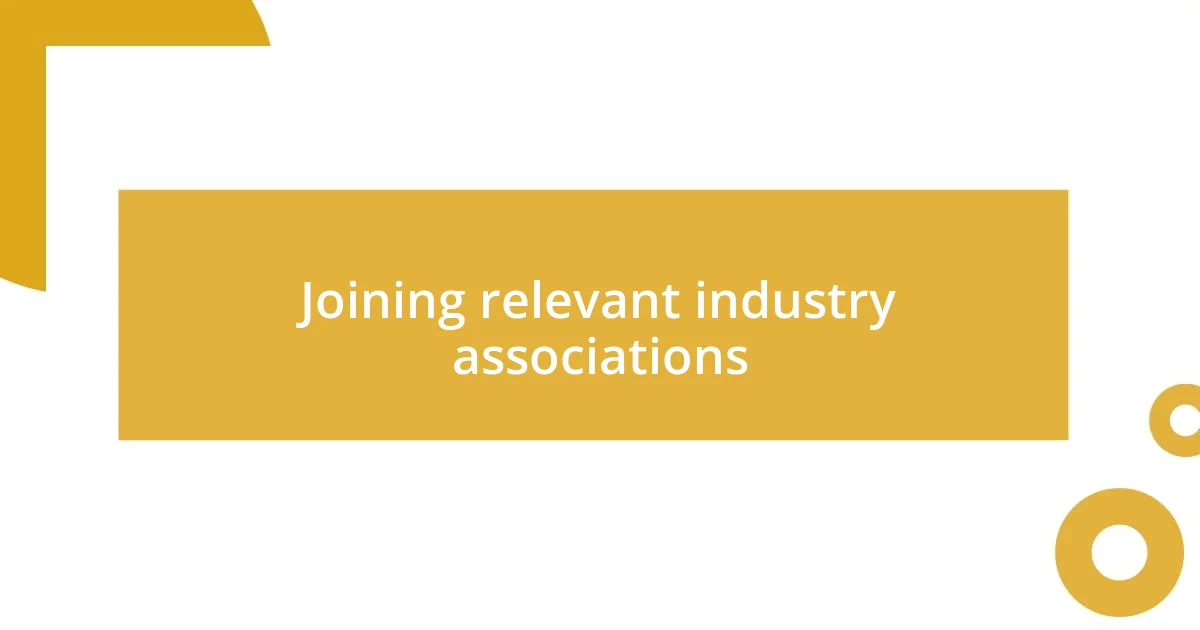
Joining relevant industry associations
Joining relevant industry associations has been pivotal in my journey to remain well-versed in regulatory changes. Early on, I became a member of an organization specific to my field. It was a decision that unfolded numerous opportunities—one of which was participating in exclusive webinars that addressed impending regulations straight from lawmakers and industry leaders. Have you ever sat in a room, virtually or in-person, surrounded by individuals passionately discussing changes that could impact your work? That excitement is contagious and pushes me to delve deeper into understanding the implications of new rules.
The real gem of these associations, however, is the member-exclusive resources. I vividly remember accessing a comprehensive regulation database that belonged to my association. It wasn’t just any database; it included historical data, trends, and expert commentaries on past regulatory shifts. This resource became my go-to reference point. When local regulations began to shift, I felt a renewed sense of confidence because I could draw on a wealth of knowledge to navigate the changes with clarity. There’s something reassuring about having reliable, curated information at your fingertips, wouldn’t you agree?
Involvement in these associations has also fostered significant connections across various levels of our industry. I still recall a conversation with a seasoned professional I met during a networking event. They shared a story about how their proactive approach in engaging with association committees had led to early insights on regulatory drafts that others were completely unaware of. This inspired me to take a more active role and seek similar opportunities. I can’t stress enough how being part of these associations can elevate your understanding and keep you a step ahead in a landscape that’s constantly evolving.
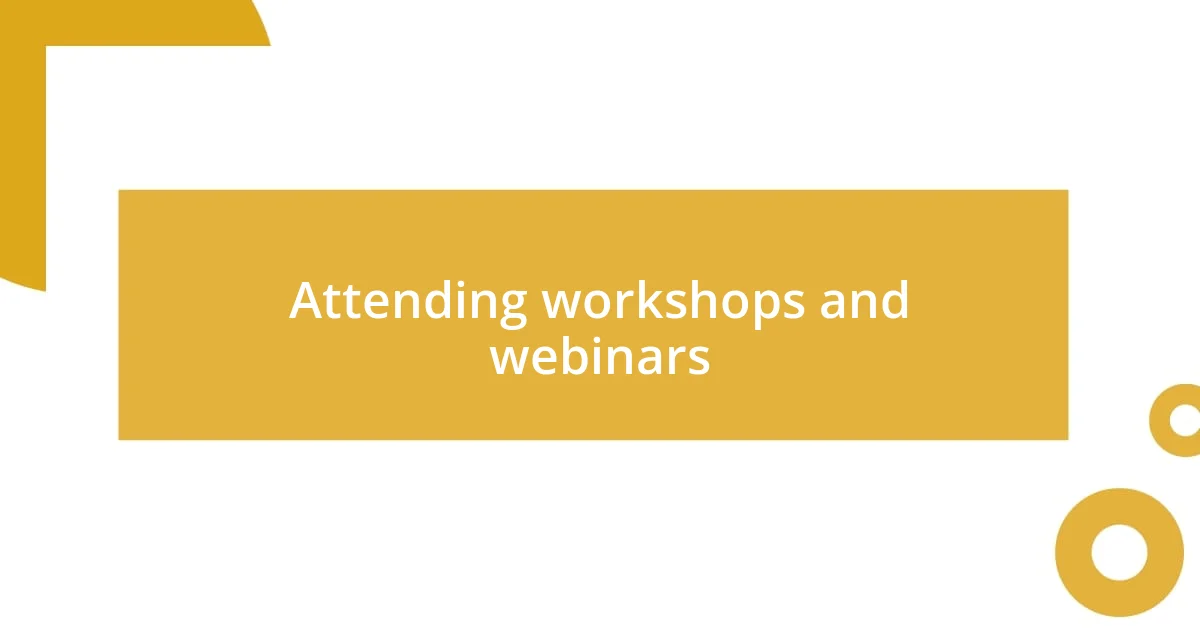
Attending workshops and webinars
Attending workshops and webinars has become one of my favorite ways to stay current with regulations. There’s something energizing about immersing myself in a structured learning environment, whether it’s in-person or online. I remember one particularly impactful webinar on data privacy laws—it was led by an expert who had also been a former regulator. Listening to their insights felt like sitting at the feet of a master, where every question I had was met with thoughtful, nuanced responses that deepened my understanding.
I often find that these sessions provide me with valuable perspectives not just on the rules, but also on the thinking behind them. For example, after attending a workshop on environmental regulations last year, I was inspired to rethink my company’s compliance strategies. The hands-on exercises allowed me to simulate real-world scenarios, making the learning experience both relevant and practical. Have you ever left a workshop with a sense of clarity and purpose? I can’t tell you how many times I’ve walked away with actionable strategies that transformed our approach to compliance.
Moreover, the networking opportunities at these events are simply priceless. One of my best professional connections came from a workshop where we were encouraged to break out into small discussion groups. It was during this session that I met a fellow attendee who shared similar industry challenges. Our ongoing dialogue has led to valuable collaborations and a deeper understanding of how we can support each other in navigating regulatory changes. Sharing experiences with others facing the same hurdles really reinforces the sense that we’re not alone in this complicated landscape; it’s a journey we can all tackle together.
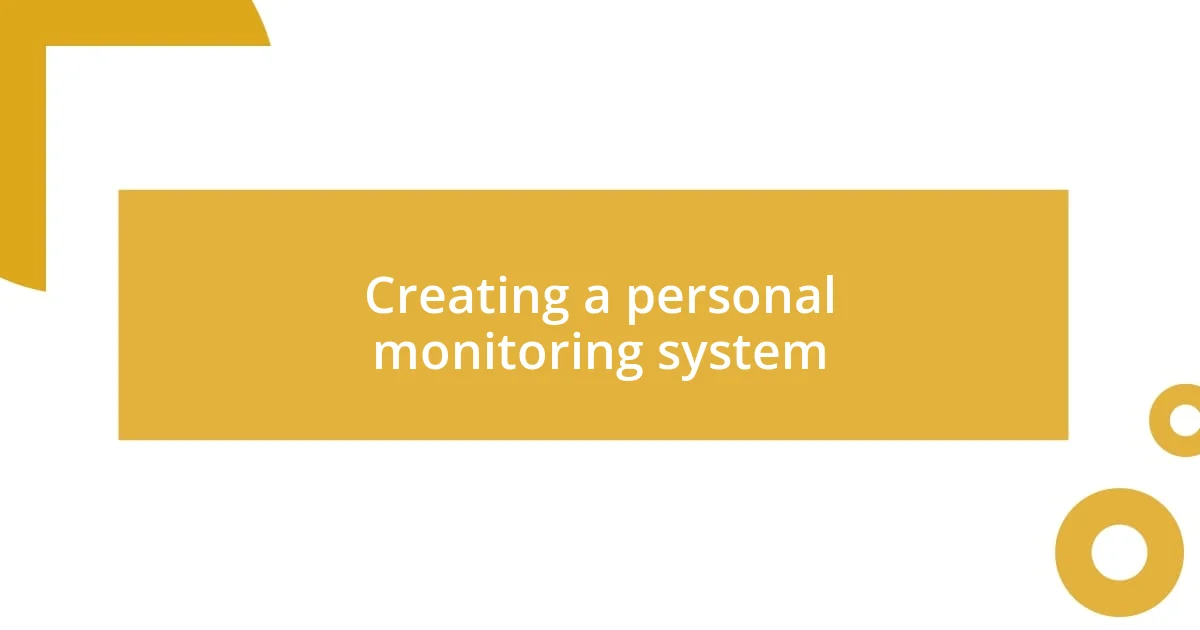
Creating a personal monitoring system
Creating a personal monitoring system has been transformative for me in addressing regulatory challenges. I developed a habit of curating a customized dashboard filled with alerts from credible sources like government websites and industry blogs. It was a bit of a game-changer, especially during that tumultuous period when multiple regulations shifted rapidly. Watching those alerts come through felt like having a personal assistant who was always one step ahead, making me feel informed and ready to act.
In addition to those alerts, I also utilize project management tools to streamline the information I gather. For instance, I’ve set up folders containing key documents, summaries, and deadlines related to various regulations. Last year, when the new compliance requirements were announced, having everything organized in one place allowed me to pivot quickly. This system not only saved me hours of searching but also minimized the stress that often accompanies last-minute changes. Doesn’t it feel good to approach regulatory updates with confidence instead of dread?
What truly elevates my monitoring system is my practice of regularly reviewing and adjusting it. I often take a step back to assess which sources have proven most valuable and what may need to be added or removed. Just the other day, I realized that a particular newsletter wasn’t providing the depth I needed, so I replaced it with a more specialized publication. This continuous refinement process ensures that my monitoring system remains adaptive, much like the regulations I’m following. Have you experienced how a well-tuned system can alleviate anxiety? It’s incredible to witness how being proactive about gathering information makes tackling regulatory changes not just manageable, but even engaging at times.










